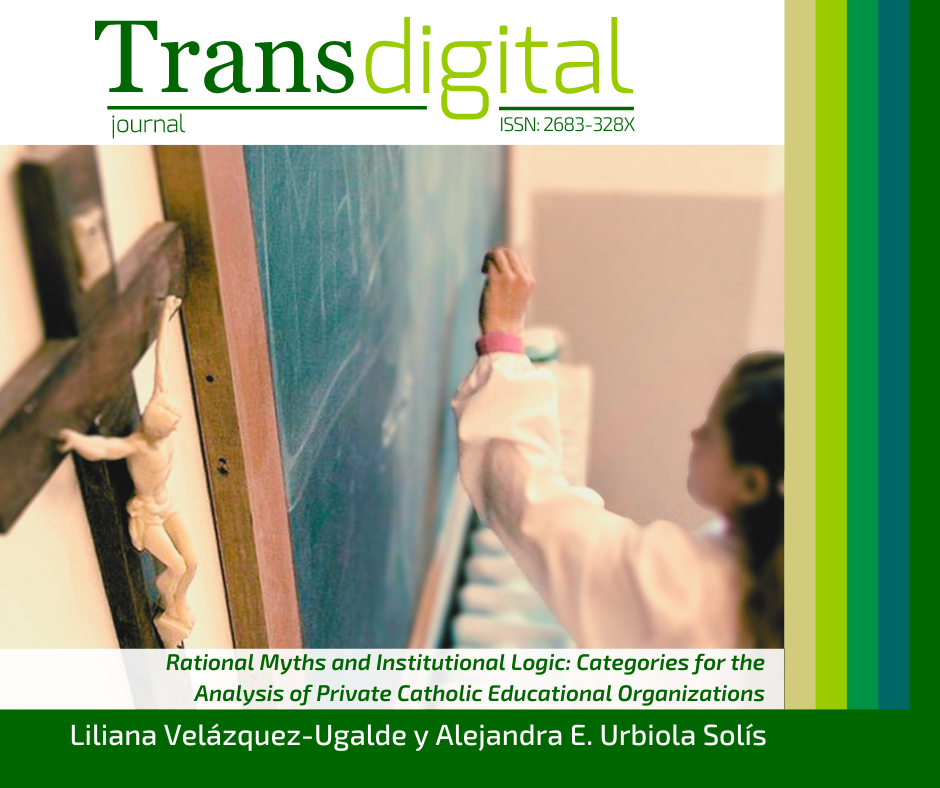Rational Myths and Institutional Logic: Categories for the Analysis of Private Catholic Educational Organizations
DOI:
https://doi.org/10.56162/transdigital205Keywords:
catholic educational organizations, organizational culture, organizational behavior, rational myths, institutional logics, new sociological institutionalismAbstract
The aim of the research was to establish the categories of analysis and the theoretical framework of rational myths and institutional logics in the reconstruction of organizational culture and managerial management in a catholic girls' school in Mexico. The research method used was qualitative content analysis, documentary, and observational review for the triangulation of information. Hemerographic records were used to systematize historical data, operational processes and regulations; the field diary, for the recovery of contextual information, and unstructured open interviews for the confirmation or clarification of data. As relevant results, the categories of rational myths and institutional logics were obtained, in addition to the identification of the New Institutionalism as the administrative sociological approach for the analysis of the construction of the educational organization. The discussion highlights that in private Catholic educational organizations, the founding documents, the collaborators, and the relationships between them determine their cultures and behaviors. Administrative science has several theories, schools and approaches that can explain its construction and provide solutions to the different phenomena that occur. In order to answer questions that have their origin in the complexity of human behaviors and decisions, an approach is required that can respond to both objective acts and subjective behavioral ones. In conclusion, it is argued that educational organizations are socially constructed spaces, through objectivities and subjectivities that try to rationalize and institutionalize themselves, but that are ultimately loaded with symbolism and conversational practices.
References
Berger, R. (2013). Now I see it, now I don't: researcher's position and reflexivity in qualitative research. Qualitative Research, 15(2)1-16. https://doi.org/10.1177/1468794112468475
Bowen, G. A. (2009). Document analysis as a qualitative research method. Qualitative Research Journal, (9)2, 27-40. https://doi.org/10.3316/QRJ0902027
Casassus, J. (1998). Marcos conceptuales para el análisis de los cambios en la gestión de los sistemas educativos. Seminario Taller Internacional Planificación y Gestión (pp. 1-13). Instituto Pedagógico Latinoamericano y Caribeño.
Domínguez Fernández, G. & Mesanza López, J. (1996). Manual de Organización de Instituciones Educativas. Editorial Escuela Española.
Friedland, R., & Alford, R. R. (1999). Introduciendo de nuevo a la sociedad: símbolos, prácticas y contradicciones institucionales. En W. W. Powell & P. J. DiMaggio (Comps.), El Nuevo Institucionalismo en el Análisis Organizacional (pp. 294-329). Fondo de Cultura Económica.
Martínez Miguélez, M. (2007). La Investigación Cualitativa Etnográfica en Educación: Manual Teórico-Práctico. (3a ed.). Editorial Trillas.
Mayring, P. (2014). Qualitative Content Analysis. Theoretical Foundation, Basic Procedures and Software Solution. Klagenfurt. https://nbn-resolving.org/urn:nbn:de:0168-ssoar-395173
Meyer, J. W. & Rowan, B. (1977). Institutionalized organizations: formal structure as myth and ceremony. American Sociological Review, 83(2), 340-363. http://www.jstor.org/stable/2778293
Münch, L. (2014). Administración. Gestión Organizacional, enfoques y proceso administrativo. Pearson Education.
Ortiz, M. A., Matamoro, V., & Psathikis, J. (2016). Guía para confeccionar un mapeo de actores. Bases conceptuales y metodológicas. Fundación Cambio Democrático. http://45.79.210.6/wp-content/uploads/2017/03/Gu%C3%ADa-para-confeccionar-un-Mapeo-de-Actores.pdf
Powell, W. W. & DiMaggio, P. J. (1999). El Nuevo Institucionalismo en el Análisis Organizacional. Fondo de Cultura Económica.
Savage, G. T., Nix, T. W., Whitehead, C. I., & Blair, J. D. (1991). Strategies for assessing and managing organizational stakeholders. Academy of Management Executive, (5)2, 61-75.
Scott, W. R. (2014). Institutions and organizations: ideas, interests, and identities. (4a. ed.). SAGE Publications.
Tanck de Estrada, D. (2010). La Educación en México. El Colegio de México.
Torres Septién, V. (1997). La Educación Privada en México. El Colegio de México.
Thornton, P. H., & Ocasio. W. (2008). Institutional logics. En R. Greeenwood et al. (Eds.), The SAGE handbook of organizational institutionalism (pp. 99-129).
Thornton, P. H., Ocasio, W., & Lounsbury, M. (2012). The institutional logics perspective. A new approach to culture, structure, and process. Oxford University Press.
Urbiola Solís, A. E. y Levin Kosberg, S. (2018). Una propuesta para el estudio de la comunicación organizacional y la construcción de significados desde lo procesual y simbólico. Administración y Organizaciones, (21)40, 51-72. https://rayo.xoc.uam.mx/index.php/Rayo/issue/download/3/RAyO%20No.%2040
Vázquez de Knauth, J. (1975). Nacionalismo y educación en México (2ª. ed., Vol. 9). Colegio de Mexico. https://doi.org/10.2307/j.ctv233n38.7
Velázquez-Ugalde, L. (2022). Mitos racionales y lógicas institucionales para el análisis de la escuela católica. Visual Review. International Visual Culture Review, 11(2), 2-12. https://doi.org/10.37467/revvisual.v9.366

Downloads
Autor de correspondencia
El autor de correspodencia se identifica con el siguiente símbolo: *Published
How to Cite
License
Copyright (c) 2023 Liliana Velázquez-Ugalde, Alejandra E. Urbiola Solís

This work is licensed under a Creative Commons Attribution 4.0 International License.
All articles in Transdigital are licensed under a Creative Commons Attribution 4.0 International License. Authors hold the copyright and retain publishing rights without restrictions.









